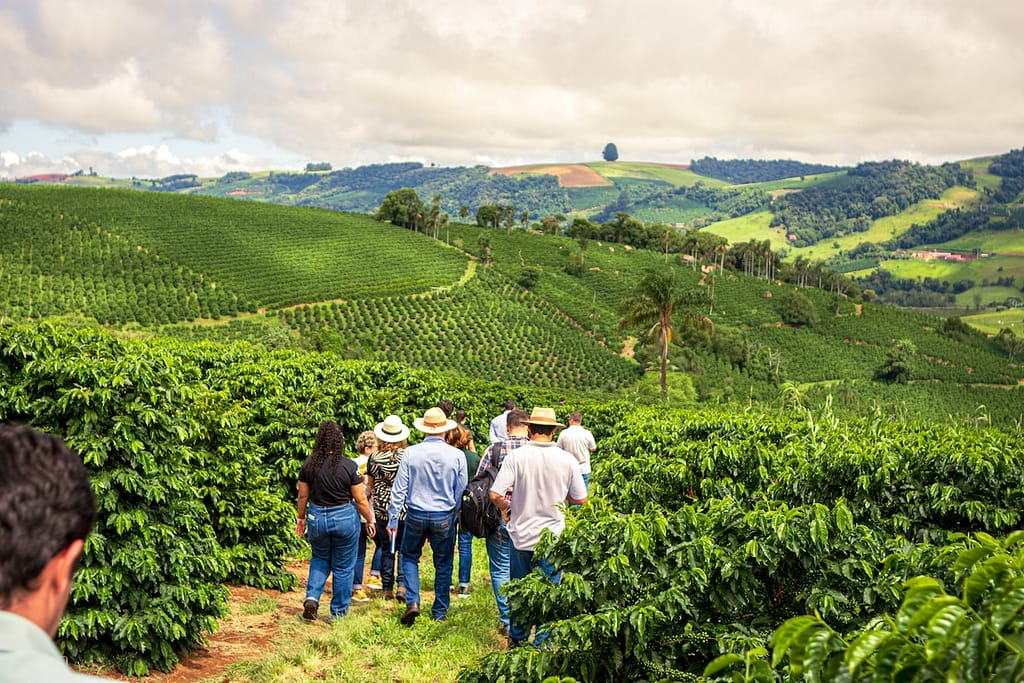[[{“value”:”All sustainability schemes recognized by GCP are eligible for roasters and retailers to be included in the annual GCP Collective Reporting on Sustainable Coffee Purchases. Image: GCP
Global Coffee Platform (GCP) has recognised Fairtrade International, Small Producer Organization and Coffee Standard, and Fair Trade USA’s Agriculture Production Standard, as equivalent to the Coffee Sustainability Reference Code (Coffee SR Code) third party assurance.
The code is a sector-wide reference on the foundations of sustainability in economic, social and environmental dimensions for green coffee production and primary processing worldwide.
The news on 23 May comes on the back of new strategic efforts from the platform, promoting sector alignment to the principles and practices of coffee sustainability.
“We’ve seen a very positive response to GCP’s call for the use of a common language on the foundations of coffee sustainability,” says Annette Pensel, Executive Director, GCP.
“The three organisations we’re pleased to announce today are the latest to join the growing list of sustainability schemes owned by GCP Members that are answering that call. We applaud this commitment to the use of a common language and the increasing openness to transparency.”
Fairtrade International Coffee Coordinator Pablo Urbina says recognition by GCP is a significant milestone that validates Fairtrade’s ongoing efforts to promote sustainable coffee production.
“It not only acknowledges our dedication, but also instils confidence among stakeholders and reinforces the integrity of our Standards. This recognition opens doors to greater collaboration to amplify our impact on coffee communities globally,” Urbina says.
Fair Trade USA Chief Program Officer Sugumar Raman says the validation affirms its commitment to sustainable and ethical agriculture.
“A commitment that further empowers global farming communities to uplift themselves and reinforces our drive for equity and growth, as we nurture a brighter sustainable future for coffee producers worldwide,” Raman says.
In addition, Montesanto Tavares Group’s GMT Green has been recognised as equivalent to the Coffee SR Code, second party assurance.
GCP now recognises a total 19 sustainability schemes, representing encouraging progress for sector alignment on coffee sustainability.
Sustainability schemes going through the GCP Equivalence Mechanism Process – which was strengthened with stricter sustainability and operational criteria in 2022 – are aligning their systems to become equivalent to the Coffee SR Code.
According to Mario Vega, GCP’s newly appointed Senior Manager Sustainable Sourcing, the announcement is the first of the year with more sustainability scheme announcements planned for Q3 and Q4.
“Alignment is a critical feature to understand, advance and accelerate coffee sustainability and we applaud the action by these GCP Members to step up and publicly measure up to the Coffee SR Code and GCP Equivalence Mechanism,” says Vega.
GCP’s Equivalence Mechanism also entails assessment against a set of operational criteria that ensures a credible and effective system for implementation and includes governance, standard-setting, assurance, data and claims requirements.
The Equivalence Mechanism, together with the Coffee SR Code and the GCP Collective Reporting on Sustainable Coffee Purchases, are connected assets developed by GCP to offer a common language on the foundations for coffee sustainability and promote the supply and demand of coffee produced following at least baseline sustainability principles.
For the assessment of the sustainability schemes, GCP partnered with the International Trade Centre, which assessed the schemes against the principles and practices of the Coffee SR Code and the operating practices that schemes should have in place to be considered credible and effective.
“The Coffee SR Code serves as a baseline, and equivalent schemes meet at least these requirements. Some schemes – especially third party schemes – may go further with their principles and practices, their commitment to transparency, and their approaches to deal with sustainability issues,” says Vega.
“We hope that these GCP Members will inspire others to step up for coffee sustainability for the urgent and essential advancement of farmer prosperity.”
All GCP recognised sustainability schemes are eligible for roasters and retailers to be included in the annual GCP Collective Reporting on Sustainable Coffee Purchases. It is another way companies are aligning and increasing transparency to advance coffee sustainability globally.
For more information, visit www.globalcoffeeplatform.org/latest/2024/increases-continue-in-the-number-of-sustainability-schemes-aligning-to-coffee-sr-code/
The post Global Coffee Platform recognises three new sustainability schemes appeared first on Global Coffee Report.
“}]]


